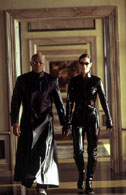
Movie Guru Rating:

Comment
on this review
| |

An overloaded sequel does less with more
by Jesse Fox Mayshark
There is a scene toward the end of The Matrix Reloaded that is intended to produce the same effect as the climax of the first Matrix movie, a revelatory a-ha that gives the story a twist and enlarges on its themes. I won't give away the secrets, but that's not because I'm afraid of spoiling anything. I just don't want to bore you.
Boredom is, in fact, the greatest menace that Reloaded faces. That was clear long before the film opened. The months of pre-release hype, goosed along by an animated 10-minute teaser, an ambitious website, and enough magazine covers to make a toppling Saddam statue jealous, had an air of calculated desperation about it: This movie wants you! You need this movie! Like the recent Star Wars sequels, The Matrix Reloaded has been pitched as an Event, a wonderworks of great socio-technological import and innovation.
And the film tries to live up to the expectations, lord knows. The Wachowski Brothers, who wrote and directed the Matrix trilogy (the third one comes out this winter), try to top everything that made the first movie a hit. But they do it in the most literal way, by just giving us more. If you liked the freeze-frame kung fu fighting tricks (and who didn't?), Reloaded gives you a dozen of them. If you thought Carrie-Anne Moss was sexy as hell in her black leather catsuits, well, how about Carrie-Anne Moss in a black leather catsuit falling off a building in slow motion firing bullets straight into the camera with a lusty leer? Or, for that matter, how about Carrie-Anne Moss naked?
And if you dug the whole stew of science fiction clichés (what-if-we're-all-just-brains-in-a-vat, reality-is-subjective, machines-are-taking-over) coupled with techno-mystical mumbo jumbo about The One and The Oracle, well boy howdy, you'll love the new levels of existential what-iffing and philosophical mirror tricks in this movie.
Except that you probably won't love them. I know I didn't. I didn't really mind any of it (especially not the catsuits), but I kept having to work to pay attention. In the middle of a four-car freeway chase involving samurai swords, 18-wheeler rooftop fighting and albino ghost-demons with dreadlocks, I was thinking about dinner. And during the interminable speeches that make up the parts of the movie not reserved for epic battles, I wondered if the Wachowskis have set a new record for soliloquies in an action film. That these speeches tend to be delivered by a monotonal and bloated Laurence Fishburne does nothing to help the dramatic tension.
The real problem is that The Matrix itself was cribbed and cobbled together from a zillion bits of pop detritus: cyberpunk, film noir, MTV, video games, Hong Kong action movies, etc. What made it feel fresh was mostly its digital razzmatazz, along with a pulpy playfulness. For all its ontological overtones, it didn't take itself seriously. The second time around, the digital effects are juiced up but inevitably not as surprising, and a ponderous Joseph Campbell tone has set in. It's as if we're actually supposed to care whether Keanu Reeves' Neo is some kind of messiah, rather than whether he still looks good in a long black coat (he does).
The movie also spends less time in the Matrix itself (the Matrix being the illusory world controlled by an evil group of machines to enslave the world's human population), and more time in the grubby underground "real" world of the human rebels. Their city, named Zion (subtle, no?), is a mish-mash of Metropolis and the Death Star—except for the big cavern where they hold religious ceremonies and dance parties, which looks just like the Temple of Doom. After a few scenes in the dark, dank city, it becomes hard to imagine why anyone would leave the Matrix, where you can at least get a hot shower.
The answer, of course, is free will. Unlike the people plugged into the Matrix, the rebels get to choose their own destinies. They get to choose whether to have sex in an elevator or a bedroom (there's a lot of slurpy sex in Reloaded, a reminder that the Wachowskis also made the Sappholicious girl-girl thriller Bound). They get to choose whether to wear angular or oval sunglasses (de rigeur, even though they all live underground). And whether to gaze at Neo with adoration or just admiration. They get to be human, in other words, albeit in a submissive mangy puppy dog kind of way.
The Wachowskis presumably have free will too. It's tempting to make jokes about the machines taking over Hollywood and cranking out endlessly repetitive sequels, but that's not fair to the machines. The mechanical aspects of The Matrix Reloaded work just fine. The machines do a respectable job of making Keanu Reeves fly (he has superpowers when he's in the Matrix) and making it look as if there are dozens of copies of Agent Smith (Hugo Weaving) running around onscreen. They probably could have even helped Fishburne look less like an overstuffed potato, if he'd let them. But there's not much the machines can do about a meandering script, humorless actors and a persistent unevenness of tone.
Thank goodness for the catsuits.

May 22, 2003 * Vol. 13, No. 21
© 2000 Metro Pulse
|